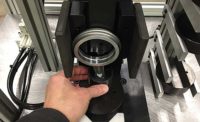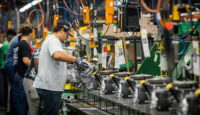AICHI, Japan—Looking to boost sales of its Mirai hydrogen fuel cell vehicle (FCV), Toyota plans to begin mass producing the second generation of the automobile. Yoshikazu Tanaka, Mirai's chief engineer, says the new model must have a lower entry price and greater travel range.
Reuters reports that, earlier this year, the 3,000th Mirai was sold in California, which remains the only American jurisdiction where FCV vehicles and refueling infrastructure are offered. To date, only about 6,000 Mirais have left Toyota’s Toyota City assembly plant near Tokyo. There, workers hand-assemble the hydrogen-powered sedans, building a maximum of 6.5 cars a day.
In a FCV, hydrogen, stored under pressure, flows to the fuel cell stack, where a chemical reaction generates an electric current to power a conventional electric drive motor. The only byproduct of the reaction is hot water, which can be manually discharged via a small flap below the car’s rear bumper. Strategic Analysis Inc. reports that claiming each fuel cell stack costs $11,000.
Toyota also hopes to increase the next-generation Mirai’s range from roughly 310 miles to around 450 miles.Possible ways to achieve this goal is to reduce the amount of expensive materials like platinum used in FCV components, and make the system more compact and powerful.
“We’re going to use as many parts from existing passenger cars and other models as possible in fuel cell trucks,” says Ikuo Ota, Toyota’s manager of new business planning for fuel cell projects. “Otherwise, we won’t see the benefits of mass production.”
The Mirai had the market to itself when it debuted back in 2015, but fuel cell versions of the Hyundai Tucson and Honda Clarity now offer competition in the market. Toyota reportedly has a range of new FCVs under development for a range of markets, including pickups, SUVs and transport trucks.






